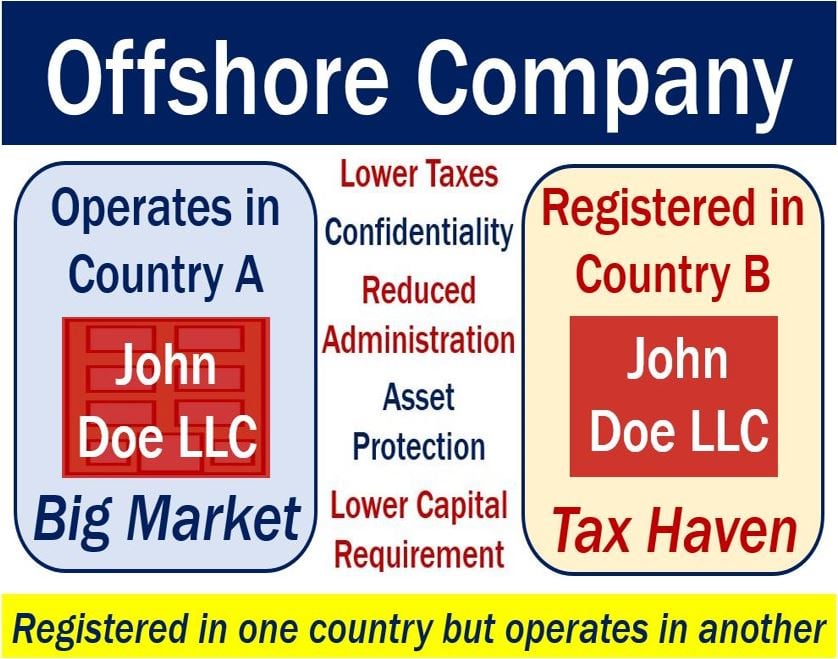An offshore company is one that you incorporate or register in another country, i.e., outside where its principle investors live. It is also an offshore company if you register it outside where its main operations and offices are. In other words, if its investors and headquarters are in Country A, but you registered it in Country B.
The term ‘offshore corporation‘ means the same as ‘offshore company.’ The word ‘offshore‘ in business means ‘in another country.’ For example, an offshore fund is a fund that exists abroad. Offshore manufacturing means relocating a factory abroad, and importing the finished goods. In other words, making the products abroad and selling them in the home market.
An offshore corporation might engage in offshoring business services or manufacturing.
Offshore manufacturing occurs when a company manufactures products in a country where raw materials or labor are cheaper. The company then imports the goods it makes into its home country.
Less frequently, the term ‘offshore company’ may refer to a firm with offshore oil and gas operations.
Offshore company and corporate tax
When people register a company in a tax haven, they aim to pay less tax.
A tax haven is a country, territory, or part of a country that offers extremely favorable tax rates. In fact, some of them have a zero tax rate.
Examples of tax havens include the British Virgin Islands, Bermuda, Gibraltar, and the Cayman Islands.
Small intermediate countries such as Singapore and Hong Kong are also popular places to register an offshore company.

There are also some advanced economies with large markets and significantly lower corporate tax rates than their competitors. In the United Kingdom, for example, corporate tax is only 21%, compared to 38% in the United States.
For the past ten years, American companies have tried to acquire British firms because of the tax benefits. After buying a British company, they move their headquarters to the UK.
Features of an offshore company
There are many different types of offshore companies. In fact, not everybody sets up an offshore company for the same reason. However, they all share the following core features:
- They do not pay corporate tax in their home jurisdiction.
- People set them up with ‘business flexibility’ in mind.
- Corporate rules and regulations are usually less stringent than in the country where they are active.
- It is difficult to get information about them. Information regarding the company’s set up, structure, activities, and behavior is not available to the public.
In the Cayman Islands, for example, there is virtually no information available to the public. However, in Hong Kong and Singapore, law enforcement authorities have access to much more data.
While some offshore companies are legitimate and beneficial, many are not. In fact, some are even criminal and harmful.
According to press sources, people use them to launder money, evade taxes, and commit fraud and white-collar crime. White collar refers to a type of job in which the worker does non-manual work, i.e., office work.
Therefore, white-collar criminals commit their crime from behind a desk or via a computer.
Many tax havens encourage people to open a company. However, the business cannot operate within its borders.
Why open an offshore company?
Here are some reasons why people decide to open an offshore company.
- To pay less tax.
- Asset protection and confidentiality.
- To grow a business and sell abroad.
- Lower operational costs and increased profitability
- Diversification of investments and risk management, i.e., to spread money and investments in different places to stay safe.
- The other country has more favorable regulations.
- Improved supply chain management, i.e., better control of how products are made and delivered.
- Access to specialized financial services and expertise.
- Facilitation of mergers and acquisitions or corporate restructuring.
- Foreign exchange advantages.
- Ease of international business transactions and financial operations.
- Protection against political or economic instability in one’s home country.
- To plan who inherits money or the business when the owner dies.
- To buy and manage real estate in different countries.
- Access to global banking and investment opportunities.
Video – What’s an Offshore Company
